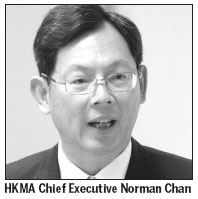HKMA: Mini-QFII to be approved very 'soon'
Updated: 2010-12-09 07:51
By Oswald Chen(HK Edition)
|
|||||||||

Hong Kong Monetary Authority Chief Executive Norman Chan said Wednesday that the mainland government will approve the launch of the mini-Qualified Foreign Institutional Investor (QFII) pilot scheme very "soon".
Speaking at a local financial seminar, Chan said that the Central Government has given its full support to the launch of the mini-QFII program, and it is speeding up the process to approve the pilot scheme.
Chan last week in Beijing cited Chinese Securities Regulatory Commission (CSRC) Chairman Shang Fulin as saying that the mainland's stock market watchdog is accelerating its preparations.
Chan envisages that the mini-QFII will help foster the development of more yuan financial products in the city such as yuan-denominated initial public offerings and trading of shares.
Meanwhile, mainland financial institutions are gearing up to grab a piece of the market even before the official launch.
The mainland-based China Securities Journal reported Wednesday that several mainland financial institutions have already submitted the designed plans of their mini-QFII financial products to the CRSC.
It is expected that investment managers will utilize the mini-QFII quota to invest mainly in mainland fixed-income securities during the initial stage after the pilot scheme launch.
A financial research manager said that if the mini-QFII pilot scheme can be launched shortly, it will enhance the investment potential of local yuan-denominated financial products.
"The mini-QFII can channel more yuan capital into investing in corporate bonds issued on the mainland, which can bring more yield returns than yuan-denominated bonds issued in the city," Harris Fraser Research Director Andy Lam told China Daily. The latest yuan-denominated bonds issued by the Ministry of Finance in Hong Kong only carried an annual yield return of 1.6 percent.
"Investing in the mainland's A-share market is the other engine under the mini-QFII mechanism that can enhance investment return. The mainland share market's valuation is relatively low compared with other global share markets and warrants long-term investment," Lam said.
He predicted the possible launch of mini-QFII will create more local demand for yuan deposits and local sales of yuan-denominated mutual funds. Local financial services providers such as Manulife (Hong Kong) and Citibank (Hong Kong) previously launched yuan-denominated mutual funds investing in mainland corporate bonds and A-share market. They were fully subscribed by local investors.
The mini-QFII program is a fund flow mechanism that allows mainland-based brokerages and mutual fund companies in Hong Kong to channel local yuan capital into the mainland's asset markets by setting an investment quota amount to each player in the market.
The so-called QFII program, which was launched in 2002, refers to the investment quotas granted by the State Administration of Foreign Exchange to foreign fund managers to invest in the mainland's asset market.
As of the end of June, there were 89 foreign financial institutions granted the QFII investment quotas, totaling a cumulative $17.72 billion.
China Daily
(HK Edition 12/09/2010 page2)